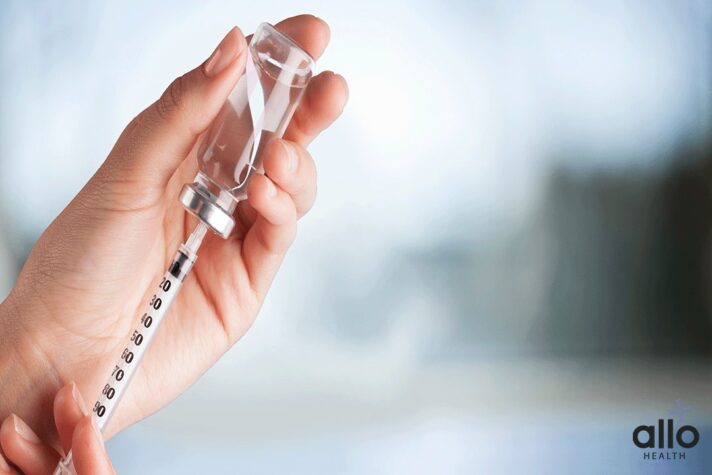Pneumococcal Vaccine: Protecting Against Serious Infections

Allo Health is dedicated to personalized well-being, offering support and trusted information tailored to individual health goals. The platform emphasizes human-generated content, led by a distinguished medical team of experts, including physicians and sexual health specialists. Their commitment to credibility involves rigorous fact-checking, authoritative research, and continuous updates to ensure accurate, up-to-date information. Allo Health's unique approach goes beyond conventional platforms, providing expert-led insights and a continuous commitment to excellence, with user feedback playing a crucial role in shaping the platform's authoritative voice.

Satadeepa is a Psychologist with 5 years of experience in the field of mental health and holds a Master's Degree in Clinical Psychology. Her areas of work interest and specialization include anxiety & mood disroders, relationship issues, self esteem development, grief, behavioural sleep medicine and sexual wellness.
Why This Was Upated?
Our experts continually monitor the health and wellness space, and we update our articles when new information became available.
Updated on 04 December, 2023
- Article was updated as part of our commitment to diversity, equity, and inclusion.

"The following blog article provides general information and insights on various topics. However, it is important to note that the information presented is not intended as professional advice in any specific field or area. The content of this blog is for general educational and informational purposes only.
Book consultation
The content should not be interpreted as endorsement, recommendation, or guarantee of any product, service, or information mentioned. Readers are solely responsible for the decisions and actions they take based on the information provided in this blog. It is essential to exercise individual judgment, critical thinking, and personal responsibility when applying or implementing any information or suggestions discussed in the blog."
What is Alprostadil?
Alprostadil is a medication that has been approved for treating various medical conditions. In India, it is available under the brand name Caverject. It is a synthetic version of a naturally occurring hormone called prostaglandin E1 (PGE1), which plays a role in the dilation and constriction of blood vessels.
How Alprostadil Works
Alprostadil works by relaxing the smooth muscles and dilating the blood vessels in the area where it is applied. This process improves blood flow and is the primary mechanism by which alprostadil helps alleviate specific medical conditions.
Forms of Alprostadil
Alprostadil comes in three different forms: injections, intraurethral suppositories, and creams.
Alprostadil Injections
Alprostadil injections, also known as intracavernous injections, are administered directly into the side of the penis. This method allows the medication to work quickly and effectively, usually within 5-20 minutes.
Alprostadil Urethral Suppositories
Alprostadil urethral suppositories, also known as MUSE (Medicated Urethral System for Erection), are small alprostadil pellets that are inserted into the urethra using a special applicator. The medication is absorbed through the urethral lining and works within 10-30 minutes.
Alprostadil Cream
Alprostadil cream, such as Vitaros, is a topical treatment applied directly to the tip of the penis. The cream is absorbed through the skin and starts to work within 5-30 minutes.
Uses of Alprostadil

Alprostadil has a variety of uses, including the treatment of erectile dysfunction, Raynaud’s phenomenon, and patent ductus arteriosus.
Erectile Dysfunction
Alprostadil is most commonly used in the treatment of erectile dysfunction (ED), a condition in which a man is unable to achieve an erect penis or maintain an erection sufficient for sexual intercourse. By increasing blood flow to the penis, alprostadil can help men achieve an erection when they are sexually aroused.
Raynaud’s Phenomenon
Alprostadil has been used off-label to treat Raynaud’s phenomenon, a condition in which the blood vessels in the fingers and toes constrict excessively in response to cold or stress. By dilating the blood vessels, alprostadil can help improve blood flow and reduce symptoms.
Patent Ductus Arteriosus
Alprostadil can also be used to treat patent ductus arteriosus (PDA) in newborn babies. PDA is a heart defect where the ductus arteriosus, a blood vessel that should close shortly after birth, remains open. This can cause breathing difficulties and other complications. Alprostadil helps close the ductus arteriosus by constricting the blood vessel.
Side Effects and Risks
As with any medication, there are potential adverse effects and risks associated with alprostadil use. It is essential to be aware of these before starting treatment.
Common Side Effects
Some common adverse effects of alprostadil include:
- Pain at the injection site (for Alprostadil injection)
- Mild urethral burning or discomfort (for Alprostadil pellets)
- Redness or warmth at the application site (for cream)
- Headache
- Dizziness
- Flushing
These adverse effects are generally mild and resolve on their own. However, if they persist or worsen, consult your healthcare provider.
Rare but Serious Side Effects
Rare but serious side effects of alprostadil include:
- Prolonged erections (longer than 4 hours) or painful erections
- Fainting
- Severe allergic reactions (e.g., rash, itching, swelling, trouble breathing)
If you experience any of these side effects, seek immediate medical advice.
Precautions
When using alprostadil, there are several precautions you should take to ensure the safe and effective use of the medication. Here are some general precautions:
- Use only as directed: Use alprostadil exactly as prescribed by your healthcare provider. Do not use it more or less than instructed, and do not use it more frequently than recommended.
- Keep it sterile: If you are using alprostadil for injection, it is important to keep the injection site clean and use a new needle and syringe for each injection. Be sure to dispose of used needles properly. If you are using alprostadil pellets or cream, it is important to wash your hands with soap thoroughly before handling it.
- Watch for side effects: Alprostadil can cause side effects, such as pain, swelling, or redness at the injection site, prolonged erections, dizziness, or fainting. If you experience any unusual or concerning symptoms, contact your healthcare provider promptly.
- Inform your healthcare provider: Let your healthcare provider know if you have a history of bleeding disorders, heart problems, or any other medical conditions. Also, tell your healthcare provider about any medications you are taking, including over-the-counter and herbal products.
- Keep it out of reach of children: Alprostadil is for use by adults only and should be kept out of the reach of children.
- Do not share needles: If you are using Alprostadil for injection, do not share needles with anyone else. Sharing needles can increase the risk of infection and other complications.
- Be cautious with certain medical conditions: Alprostadil should be used with caution in people with certain medical conditions, such as liver or kidney disease, low blood pressure, or bleeding disorders.
It is important to discuss any questions or concerns about alprostadil with your healthcare provider to ensure safe and effective use. They may provide you with specific instructions based on your individual needs and medical history.
Contraindications
Before using alprostadil, inform your healthcare provider of any medical conditions, allergies, or medications you are currently taking. Some specific contraindications for alprostadil use include:
- History of priapism (prolonged erections)
- Blood clotting disorders
- Penile implants or abnormalities
- Peyronie’s disease
- Allergy to alprostadil or any of its ingredients
Drug Interactions
Alprostadil may interact with several other drugs or substances. Here are some examples:
- Anticoagulants: Alprostadil may increase the risk of bleeding when used with anticoagulant medications such as warfarin or heparin.
- Alpha-blockers: Alprostadil may increase the hypotensive effects of alpha-blockers such as doxazosin or terazosin, which are used to treat high blood pressure.
- Phosphodiesterase inhibitors (PDE5 inhibitors): Alprostadil should not be used with PDE5 inhibitors such as sildenafil, tadalafil, or vardenafil, as this may increase the risk of hypotension (low blood pressure).
- Antihypertensives: Alprostadil may enhance the hypotensive effects of antihypertensive medications such as diuretics or beta-blockers, which are used to treat high blood pressure.
- Sympathomimetic drugs: Alprostadil may interact with sympathomimetic drugs such as epinephrine or norepinephrine, which are used to treat shock or low blood pressure.
It is important to inform your healthcare provider of all medications, supplements, and herbal products you are taking before starting alprostadil to avoid potential drug interactions.
Conclusion
Alprostadil is a versatile medication with various uses, including the treatment of erectile dysfunction, Raynaud’s phenomenon, and patent ductus arteriosus. Available in injections, suppositories, and cream forms, it offers different options for administration. As with any medication, it is essential to be aware of the potential side effects and risks, as well as any precautions and contraindications before starting treatment.
Frequently Asked Questions (FAQs)
Q: How long does Alprostadil take to work?
A: The onset of action varies depending on the form of alprostadil used. Injections typically work within 5-20 minutes, intraurethral suppositories within 10-30 minutes, and the cream within 5-30 minutes.
Q: Can I use Alprostadil if I’m taking other medications for erectile dysfunction?
A: It’s essential to consult your healthcare provider before combining alprostadil with other ED medications, as this may increase the risk of side effects or lead to a dangerously prolonged erection.
Q: Is Alprostadil covered by insurance?
A: Coverage for Alprostadil depends on your specific insurance plan. Consult your insurance provider to determine if your plan covers this medication.
Q: Can women use Alprostadil for sexual dysfunction?
A: Alprostadil is not approved for use in women. If you’re a woman experiencing sexual dysfunction, consult your healthcare provider for alternative treatment options.
Q: Can I buy Alprostadil over the counter?
A: Alprostadil is a prescription medication and is not available over the counter. You will need a prescription from a healthcare provider to obtain this medication.
Sources
- Caverject (alprostadil) [package insert]. Chesterbrook, PA: OptiNose US, Inc.; 2020.
- DailyMed. Alprostadil injection. National Institutes of Health. https://dailymed.nlm.nih.gov/dailymed/drugInfo.cfm?setid=9f9ad090-1a81-4d3f-aa3e-696f02b26ebe. Updated January 2022. Accessed March 3, 2022.
- “Alprostadil Injection.” MedlinePlus, U.S. National Library of Medicine, 15 Aug. 2021, https://medlineplus.gov/druginfo/meds/a607023.html.
- Alprostadil Injection: MedlinePlus Drug Information.” National Institutes of Health, U.S. National Library of Medicine, https://medlineplus.gov/druginfo/meds/a607023.html#interactions.
- “Alprostadil Drug Interactions.” Drugs.com, Drugs.com, https://www.drugs.com/drug-interactions/alprostadil.html.
- Indian Journal of Urology: This peer-reviewed journal has published a study on the effectiveness and safety of Alprostadil in Indian men with erectile dysfunction. (https://www.ncbi.nlm.nih.gov/pmc/articles/PMC3387473/)







































